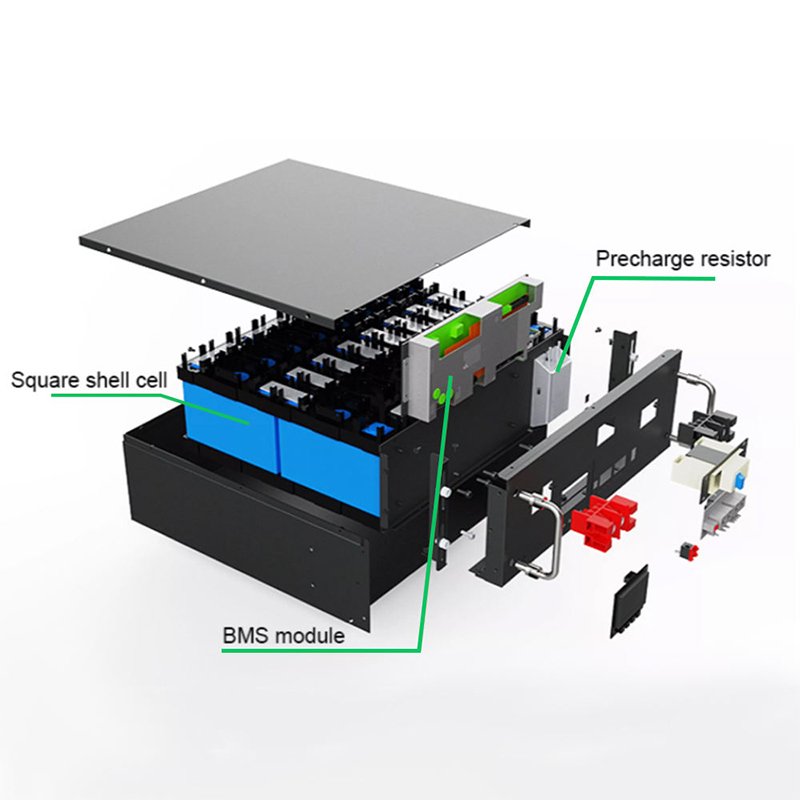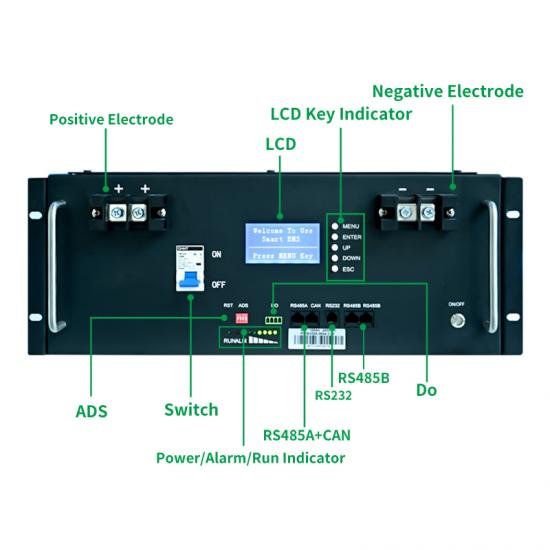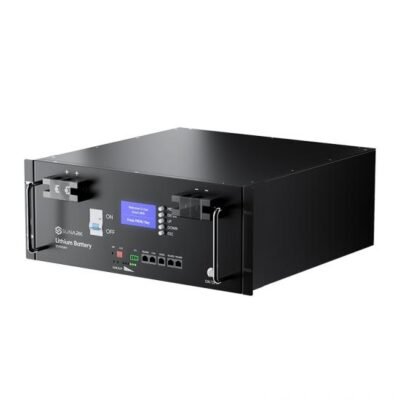
SunArk Deep Cycle LiFEPO4 Battery Pack 48V 5KW 10KW For Home Storage
SunArk LiFePO4 (Lithium Iron Phosphate) battery pack is a type of rechargeable battery that uses lithium iron phosphate as its cathode material. It is known for its high energy density, long cycle life, and excellent thermal stability. LiFePO4 batteries have become popular as a storage solution for renewable energy systems, including solar energy.
- Brand:SunArk
- Max charging current::100A
- Operation Voltage:42-54Vdc
- Life cycles (80% DOD, 25%):6000 Cycles
- Lithium battery standard:UL1642.IEC62619.UN38.3.ROHS.CE-EMC
- Operation temperature:20°C to 60°C @60+-25% Relative Humidity
- Storage temperature:o°C to 45*C @60+/-25% Relative Humidity
- Storage time / temperature:5 months @ 25°C. 3 months @ 35*C: 1 month @ 45°C
- Product categories
how can we help you
Description

Here are some key features of Lifepo4 battery packs for solar energy:
1- High energy density: LiFePO4 batteries provide a high capacity to store energy, allowing for efficient energy storage in solar applications.
2- Long cycle life: LiFePO4 batteries have a longer lifespan compared to other lithium-ion battery chemistries. They can typically endure thousands of charge/discharge cycles without significant degradation.
3- Safety: LiFePO4 batteries are considered safer than other lithium-ion battery chemistries. They have a lower risk of thermal runaway and are less prone to overheating or catching fire.
4- Fast charging: LiFePO4 batteries can be charged at higher rates compared to other lithium-ion batteries. This allows for quicker charging of the battery pack using solar energy.
5- Wide temperature range: LiFePO4 batteries perform well in a wide range of temperatures. They can handle both extreme cold and hot environments more effectively compared to other lithium-ion batteries.
6- Maintenance-free: LiFePO4 batteries do not require regular maintenance, such as watering or equalizing, as is the case with lead-acid batteries commonly used in solar energy storage.
7- Environmental friendliness: LiFePO4 batteries are considered more environmentally friendly compared to other battery chemistries. They do not contain toxic materials like lead or cadmium.

What’s the key function of our solar lifepo4 lithium battery?
1- Solar Power Storage: The primary function of a solar lithium battery is to store the excess electricity generated by solar panels.
2- Load Shifting: Solar lithium batteries enable load shifting, which involves using stored energy during peak demand periods when electricity rates are higher or when solar power generation is insufficient.
3- Backup: Solar lithium batteries can provide backup power in the event of a power outage.
4- Power Smoothing: Solar power production can fluctuate due to factors such as varying sunlight intensity and cloud cover.
5- Peak Demand Reduction: By storing energy during off-peak periods and discharging it during peak demand periods, solar lithium batteries can help reduce peak demand on the electrical grid.

How to select a reliable LiFEPO4 lithium battery cell?
1- Battery Chemistry: Lithium-ion batteries are commonly used in solar applications due to their high energy density, long cycle life, and good charge/discharge efficiency.
2- Capacity: Battery capacity is the amount of electrical energy a battery can store, typically measured in ampere-hours (Ah) or kilowatt-hours (kWh).
3- Cycle Life: Cycle life refers to the number of charge-discharge cycles a battery can endure before its capacity significantly declines.
4- Efficiency: Battery efficiency influences the overall performance of a solar system.
5- Safety: Battery safety is crucial to prevent hazards like thermal runaway or fires.
7- Manufacturer Reputation: Choose batteries from reputable manufacturers with a track record of producing reliable and high-quality products.

How many process we have to produce a good quanlity lithium battery?
1- Calculate the exact battery bank capacity: Calculate the desired capacity and voltage for your battery bank based on your application needs.
2- Choose lithium batteries: Choose lithium batteries that meet your requirements and are designed for use in a rack configuration.
3- Choose a racking system: Select a racking system that is designed for the specific lithium batteries you are using.
4- Prepare the rack: Install the racking system and ensure it is securely mounted and stable.
5- Connect the batteries: Install the lithium batteries in the rack, following any guidelines provided by the battery manufacturer.
6- Configure the battery management system (BMS): If your lithium batteries require a BMS, install and configure it according to the manufacturer’s instructions.
7- Test and verify: Once the batteries are properly racked and connected, perform thorough testing to ensure proper functioning and performance.
BTW, each battery will be charged to 100% before delivery.
However, it’s important to note that LiFePO4 batteries may have a higher upfront cost compared to other battery technologies. Nonetheless, their long-term durability and reliability can offset the initial investment.
When using LiFePO4 battery packs for solar energy storage, it’s essential to properly size the battery capacity to match the energy requirements of the solar system. This ensures efficient utilization of the stored energy and maximizes the system’s performance.
FAQs:
Q1: Do you support OEM/ODM?
A:Definitely, OEM&ODM service is supported with a certain quantity,including customize logo,package and label;
Q2: What about the normally the production time?
A: The production time is normally 15 working days. but we will always prepare some stocks for popular models.
Q3: Can you provide DDP service?
A:Yes, if you are a personal customer and don’t want to deal with the customs, we can provide DDP service to your address.
Q4: How about the warranty and how to claim?
A: Warranty period are 10 years since you receive the battery, our professional after-sales team will deal with all warranty issues.
In terms of the future of 48V lithium-ion batteries, there are several trends and developments to consider:
1. Electric vehicles: 48V lithium-ion battery systems are being increasingly adopted in mild hybrid vehicles, where they complement the main high-voltage battery pack. This allows for improved fuel efficiency and better performance without the need for a full high-voltage system.
2. Renewable energy storage: As the demand for renewable energy grows, 48V lithium-ion batteries can be utilized for energy storage systems, allowing for efficient storage and use of clean energy.
3. Advanced charging infrastructure: Future developments in charging infrastructure, such as faster charging stations and wireless charging technology, will further enhance the usability and convenience of 48V lithium-ion batteries.
4. Improvements in battery technology: Ongoing research and development efforts are focused on improving the energy density, cycle life, and safety of lithium-ion batteries. These advancements can lead to even better performance and wider adoption of 48V lithium-ion batteries in various applications.
Overall, the future of 48V lithium-ion batteries looks promising, and their continued development and adoption in different sectors are expected to contribute to a more sustainable and efficient energy landscape.
Related Tags:
Leave A Message
If you are interested in our products and want to know more details,please leave a message here,we will reply you as soon as we can.
Subject :




